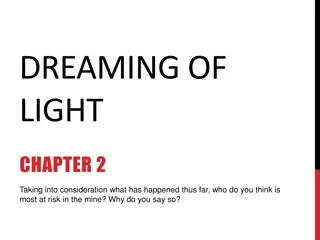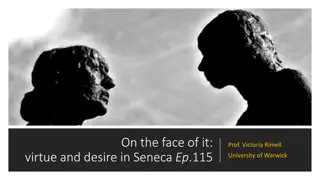Understanding Language in Stoicism: Significance and Corporeality
Language in Stoicism plays a crucial role in the process of assenting to impressions by focusing on corporeality, reason, and truth. It distinguishes between the mundane vocal sounds, articulated speech, and significant language to convey meanings effectively. The significance of language lies not i
2 views • 13 slides
Tensions Rise in the Mine: A Closer Look at "Dreaming of Light" Chapter 2
In Chapter 2 of "Dreaming of Light," tensions escalate in the mine as Faceman's brutal behavior and Regile's stoicism create a volatile environment. The miners, particularly Taiba, face heightened risks as they navigate power dynamics and harsh working conditions. The narrative delves into themes of
0 views • 11 slides
Roman Political History: From Rise of Pompey to Reign of Augustus
In the tumultuous period of Roman history from the rise of Pompey to the reign of Augustus, we witness pivotal events such as the Alliance of the First Triumvirate, the civil war between Pompey and Julius Caesar, Caesar's assassination, the rise of Octavian, and the establishment of the Second Trium
0 views • 20 slides
Exploring Virtue and Desire in Seneca's Philosophy
Seneca presents a nuanced version of Stoicism, allowing for human interaction and love while emphasizing the purity of love separate from bodily desires. Through Seneca's writings, the distinction between love and desire is made clear, touching on themes of body, mind, desire, and veneration. The in
0 views • 15 slides
Hemingway: A Literary Portrait of the Lost Generation
Hemingway, an expatriate writer in Paris, epitomized the Lost Generation with his raw and poignant portrayal of post-war disillusionment and trauma. Through his powerful use of language and tight, economical style, he captured the harsh realities of life and the futility of war. Hemingway's works re
0 views • 21 slides




